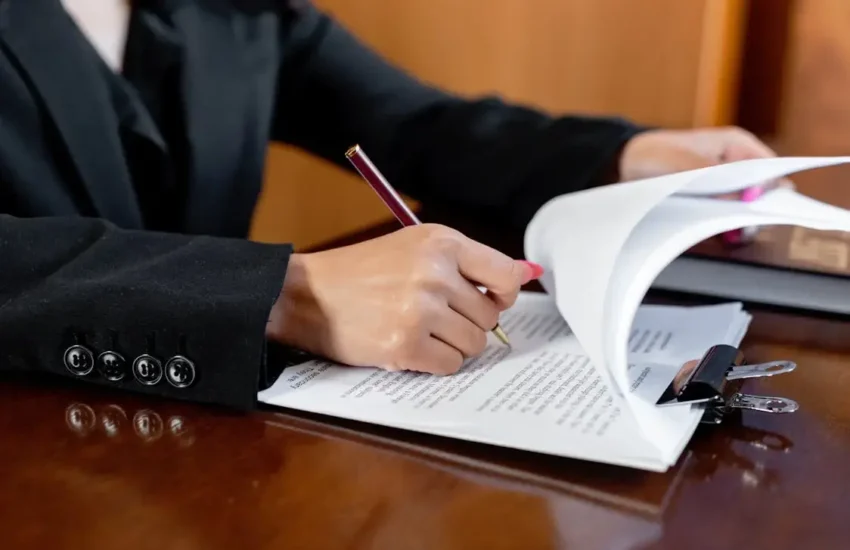Effective Communication with Your Maryland Divorce Attorney
Going through a divorce isn’t easy.
It’s stressful, emotional, and sometimes downright overwhelming. A qualified attorney by your side during your divorce proceedings can significantly impact the outcome.
Effective communication with your attorney becomes essential as it will save you from unnecessary expenses and prevent numerous problems.
This guide will help you if you are part of this group.

Key Points Ahead
- Why Good Communication Matters
- Setting Up Effective Communication from Day One
- What Information Your Attorney Needs
- How to Ask the Right Questions
- Dealing with Emotional Conversations
Why Communication Matters in Divorce Cases
The effectiveness of your attorney depends entirely on how well you communicate all the necessary information. When you hire a leading divorce lawyer to represent you they become your voice in the legal system. Your attorney cannot effectively represent you if they lack all the necessary information.
Poor communication can lead to:
- Misunderstandings about your goals
- Missing important deadlines
- Overlooking valuable assets
- Higher legal bills (yes, really!)
- Unnecessary stress and frustration
A strong partnership between you and your attorney emerges through clear communication which allows for successful navigation of challenging divorce situations. The divorce rate in Maryland stands at 2.7 per 1,000 people according to 2025 data making strong partnerships especially vital.
Setting Up Effective Communication from Day One
Establishing good communication begins with your initial meeting. Here’s the best way to start your interaction correctly.
Be Honest About Your Expectations
It is important for your attorney to understand your specific goals during the divorce process. Are you focused on custody arrangements? Is property division your main concern? Are you aiming to maintain friendly relations or do you already have strategies for a legal battle?
When you express your expectations clearly to your attorney it enables them to develop an effective strategy for your case. This opportunity allows them to give you realistic feedback about what state law permits.
Establish Communication Protocols
Right from the start, talk about:
- How often you’ll communicate
- Preferred methods (email, phone, text)
- Expected response times
- Identify which person to reach out to if your attorney cannot be contacted
- How emergency situations will be handled
Establishing clear communication guidelines helps prevent future frustration. The most suitable divorce lawyer for you will have a communication style that aligns with your requirements.
What Information Your Attorney Needs
Your attorney requires complete details to represent your case effectively. Don’t hold back on:
Financial Information
- Bank statements and account numbers
- Retirement accounts and pensions
- Property deeds and mortgage statements
- For proper representation your attorney needs your tax returns from the last three to five years.
- Business interests and valuations
- Debts and liabilities
- Recent major purchases
Personal Information
- Details about your marriage timeline
- Information about children
- Any history of abuse or misconduct
- Health concerns that may impact settlements
- Any upcoming plans that could change custody arrangements or modify support requirements
A comprehensive approach at the start helps avoid unexpected issues and saves time down the road. Maryland sees that 25% of divorce cases are now “gray divorces” involving individuals who are 50 years of age or older. These divorces often possess intricate financial details which need heightened attention to detail.
How to Ask the Right Questions
Don’t be afraid to ask questions! Here’s what you should know:
Legal Terms
Ask about any terms you don’t understand. Family law has its own language:
- Equitable distribution
- Pendente lite
- Limited vs. absolute divorce
- Marital property
- Best interests standard
Always ask questions when you feel confused rather than pretending to understand.
Timeline & Cost
It’s perfectly reasonable to ask:
- How long will my divorce likely take?
- Which factors have the potential to either speed up or slow down the divorce procedure?
- How are fees calculated?
- What affects the total cost?
The American Psychological Association reports that first marriages dissolve through divorce at a rate of 41%.
Dealing with Emotional Conversations
Divorce inevitably triggers powerful emotional responses. Follow this method for addressing difficult discussions with your attorney.
Take a Breath First
Before contacting your attorney you should pause if you feel overwhelmed or angry because emotional discussions can escalate costs needlessly. When you have emotional discussions with your attorney you usually find them unproductive and they lead to unnecessary legal fees.
Separate Facts from Feelings
When discussing emotional topics:
- I want you to know about something that’s really hard for me to share…
- Focus on relevant facts first
- Then explain why it matters to you
- Be clear about what outcome you want
By following this approach your attorney gains insight into your emotional state and legal issues.
Know When to Seek Additional Support
The Maryland divorce analysis report shows that women started 66% of later life divorces while men initiated 41%. These numbers demonstrate the emotional complexity involved in divorce proceedings.
If you’re struggling emotionally:
- Consider working with a therapist
- Join a divorce support group
- Make sure not to use your attorney as your sole source of emotional support.
Your attorney is there for legal guidance. Therapy sessions for emotional support improve your communication abilities with your legal team.
Communication Do’s and Don’ts
This brief guide explains effective and ineffective communication techniques with your divorce attorney.
DO:
- Respond promptly to requests for information
- Be organized with your documents and questions
- Take notes during meetings and calls
- Be honest even about uncomfortable topics
- Follow up in writing after important conversations
DON’T:
- Hide information – it always comes out eventually
- Expect 24/7 availability – respect business hours
- Skip appointments without proper notice
- Make decisions without understanding consequences
- Avoid sharing your strategy on social media platforms and with your former partner.
Adhering to these simple rules can significantly enhance the progression of your case. Law firms in Maryland handle every type of case effectively because the state maintains a national average divorce rate of about 2.7 per 1,000 which allows them to develop expertise but the cases that proceed without issues are the ones where client-attorney communication is strong.
Using Technology to Stay Connected
Employing technology leads to substantial improvements in communication between you and your divorce attorney.
Digital Document Sharing
- Use secure cloud storage for documents
- Keep files clearly labeled
- Upload requested items promptly
- Ask about client portals for easier access
Virtual Meetings
Maryland divorce rates stand at 2.4 per 1,000 and attorneys now provide:
- Video calls for detailed discussions
- Phone check-ins for quick updates
- Secure messaging for simple questions
Email Efficiency
Keep emails professional:
- Use clear subject lines
- Focus on one topic per email
- Be concise (emails may be billed hourly)
Communication During Critical Moments
Certain stages during your divorce will need you to focus more on communication.
During Negotiations
Your attorney enters negotiations with the legal representative of your spouse during this phase.
- Be available for quick consultations
- Respond promptly to settlement proposals
- Clearly state your priorities and bottom lines
- Demonstrate flexibility on matters which are not essential.
Effective negotiation communication commonly results in improved settlement outcomes and reduced need for court proceedings.
Before Court Appearances
If your case does go to court:
- Request a pre-court meeting to review strategy
- Practice answering likely questions
- Learn the appropriate clothing choices and proper behavior for court appearances.
- Know exactly what documents to bring
Being well-prepared lowers anxiety levels and enhances the possibility of achieving a positive result.
Final Takeaways
The divorce rate of 2.7 per 1,000 in Maryland makes effective attorney communication vital.
Remember these key points:
- Be honest and thorough with information
- Ask questions when you don’t understand
- Keep emotions separate when possible
- Use established communication protocols
- Leverage technology for efficiency
Prioritizing communication helps to reduce costs and enhances the potential for successful results. Your attorney will serve as your representative during this difficult period but requires your cooperation to do so successfully.


